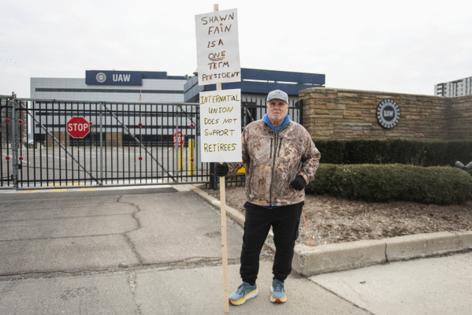Stellantis temp workers thought they had secured full-time careers. Now many are jobless
Published in Automotive News
When Ashley Wilmoth was hired at Stellantis NV's Warren (Michigan) Truck Assembly Plant last April, she made just $15.78 an hour but figured she would soon work her way into a full-time role with better pay and benefits.
The 28-year-old was even more confident after the new contract between Stellantis and the United Auto Workers was ratified last fall. It said thousands of supplemental employees like herself, also known as temps, would be converted into full-time roles with long-term job security.
Instead, Wilmoth and dozens of her supplemental colleagues at the plant were terminated in January — part of a larger layoff of 539 such workers that month across several Stellantis plants. Last week, another 341 supplemental workers at the Toledo (Ohio) Assembly Complex were let go, along with dozens of others spread across several other plants, including Warren Truck.
"I thought if I worked really hard, and showed up every day, and was reliable and dependable, I would have job security," Wilmoth said. "But I did not."
For many Stellantis workers like Wilmoth, last fall's new UAW contract was a win. These supplementals — who have long helped fill scheduling gaps at Stellantis plants and sometimes are assigned full-time hours — secured new starting wages of $21 per hour, more shift flexibility, more union rights and more benefits. Stellantis was to roll 3,200 over to full-time status within the contract's first year, and any newly hired workers with the second-tier status would automatically be converted to full-time after nine months.
But workers and local union officials said they didn't realize hundreds of layoffs would also be part of the deal. Now, UAW officials have said, it appears Stellantis only plans to keep around 500 supplemental workers on the payroll, down from about 5,200 last fall.
Wilmoth said it seems like the new contract was "filled with loopholes" for temp workers like her, adding she doesn't believe UAW leaders are doing enough to fight to get their jobs back. She organized a protest outside UAW Solidarity House in Detroit earlier this month to drive home the point.
But UAW President Shawn Fain said in a statement this week that the union is advocating for the laid-off Stellantis workers. He noted that under the new contract, around 3,000 supplementals have received "life-changing raises and benefits."
"And yet Stellantis has chosen to take the low road and terminate around 2,000 others, while the CEO gives himself a 56% raise to an astonishing $40 million," said Fain, referring to Carlos Tavares' large compensation increase since 2022. "When we said this is about corporate greed, that’s what we meant. Stellantis can do right by every last one of its workers, and we will fight to make sure they do.”
UAW advocacy group Unite All Workers for Democracy was circulating a petition in recent weeks calling on the company to reinstate terminated workers. The organization said beyond the Toledo plant — which has long relied heavily on a large supplemental workforce — there had also been significant layoffs recently at Stellantis' Jefferson and Mack assembly complexes in Detroit, as well as the Sterling Heights (Michigan) Assembly Plant.
Stellantis, owner of Chrysler, Dodge, Jeep and Ram, posted a record $20 billion in net profit last year, though its sales in the United States were down 1% from 2022. The company, which has not confirmed the number of layoffs it has carried out in recent weeks, said in a statement sent by spokesperson Ann Marie Fortunate that it "regularly analyzes staffing levels at our manufacturing facilities to ensure they are operating as efficiently as possible," and confirmed that it is reducing supplemental employee levels "across much of our U.S. footprint."
The company added that the number of employees laid off at its Toledo and Mack plants was ultimately fewer than it initially estimated. Stellantis had sent notices in December warning of potentially up to about 3,600 layoffs combined between the facilities.
The cuts "will help improve the efficiency, productivity and market competitiveness of our facilities as we implement our Dare Forward 2030 strategic plan," the company's statement said.
At the Toledo plant, which builds the Jeep Wrangler SUV and Gladiator pickup, about 900 supplemental workers were converted to full-time status. Some 224 of those converted employees got to keep working at the facility, while the rest have been reassigned to other plants, primarily in Metro Detroit, union officials have said. Many are now commuting to the Jefferson facility, as well as a Stellantis warehousing facility on nearby Freud Street.
Most of the remaining supplemental workers at the facility have now been laid off, UAW officials said, or will be soon.
Part of the problem for Jeep plant staffing is declining sales of both vehicles. The Wrangler went from 265,000 in sales in 2018 to 155,000 last year, while the Gladiator dropped from about 90,000 sales in 2021 to 55,000 last year.
Bruce Baumhower, president of UAW Local 12, which represents workers at the Jeep plant, said he was frustrated that the union and company have been calling the recent cuts "terminations." He said that's a bad look for the records of many of the workers who now must go find new jobs.
"Volume-related layoffs is what these are, and to call it anything else is unacceptable, and unfair to our members," he said, adding he believes that those who lost their jobs should at least be given an opportunity to be called back to the plant in the future if it starts staffing up again.
Alex Pigman, 27, was among those Jeep supplemental workers let go in the most recent cut at the plant last weekend. He said he had come to Toledo from Cleveland more than a year ago to work at the plant and had hoped to build a career there.
When the new UAW contract with Stellantis was approved last year, he said he felt positive that he'd be rolled over to full-time quickly. Instead, he is job hunting.
"It's such a big company, I just don't understand getting rid of your cheapest labor," Pigman said this week, adding that in retrospect the new contract feels like "all a facade."
Both Pigman and Wilmoth said they were particularly frustrated that — despite contract language saying supplementals would be eligible — they did not receive profit-sharing checks from Stellantis this year before being terminated.
Eric Graham, the former UAW Local 140 president for Warren Truck and a team leader at the plant, said language protecting supplemental employees has improved over the last couple of contracts, "but that doesn't mean they're fully protected."
At Warren Truck, which makes Jeep Wagoneer SUVs and the Ram 1500 Classic pickup, the remaining 14 supplementals on staff were terminated in recent days, he said. Another 100 or so were recently granted full-time status but many of them were reassigned to other Stellantis facilities.
"It's kind of cold-blooded," he said of recent firings, noting the long hours many of the supplementals have been asked to work over the years.
Wilmoth said she was among those supplementals who'd worked hard, "never missed a day, never was late, never was taken off a job for not producing quality work."
She said her hours surged ahead of last fall's strike as Stellantis sought to churn out more vehicles as it anticipated the work stoppage. But now, she said, she'll never get to see the gains won from that strike.
©2024 www.detroitnews.com. Visit at detroitnews.com. Distributed by Tribune Content Agency, LLC.










Comments